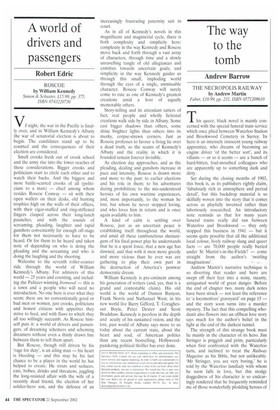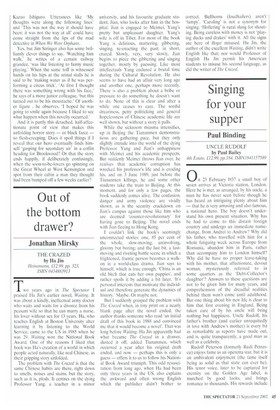The way to the tomb
Andrew Barrow
THE NECROPOLIS RAILWAY by Andrew Martin
Faber, .£10.99, pp. 231, ISBN 0571209610
This queer, black novel is mainly concerned with the special funeral train service which once plied between Waterloo Station and Brookwood Cemetery in Surrey. Its hero is an intensely innocent young railway apprentice, who dreams of becoming an engine driver 'of the better sort', and its villains — or so it seems — are a bunch of hard-bitten, foul-mouthed colleagues who are apparently up to something dark and dirty.
Set during the closing months of 1903, this book is, as its publishers rightly claim, 'fabulously rich in atmosphere and period detail', but this backdrop material is so skilfully woven into the story that it comes across as playfully invented rather than laboriously researched. An introductory note reminds us that for many years funeral trains really did run between Waterloo and Brookwood — they only stopped this business in 1941 — but it seems quite possible that all the additional local colour, lively railway slang and queer facts — are 70,000 people really buried under St Martin's-in-the-Fields? — come straight from the author's 'swirling imaginations'.
Andrew Martin's narrative technique is so diverting that reader and hero are swept off their feet into a noisy, steamy, antiquated world of great danger. Before the end of chapter two, many dark notes have been struck — not least the reference to 'a locomotives' graveyard' on page 15 — and the story soon turns into a murder mystery. The fact that this compelling whodunit also flowers into an offbeat love story says much for the author's belief in the light at the end of the darkest tunnel.
The strength of this strange book must lie mainly in the character of its hero. Jim Stringer is priggish and prim, particularly when first confronted with the Waterloo tarts, and inclined to treat the Railway Magazine as his Bible, but not unlikeable. 'Mr Stringer, you are very boring,' he is told by the Waterloo landlady with whom he soon falls in love, but this stodgy doggedness of his character is so endearingly rendered that he frequently reminded me of those wonderfully plodding heroes of Kazuo Ishiguro. Utterances like 'My thoughts were along the following lines' and .This was not the way it should have been: it was not the way at all' could have come straight from the lips of the mad detective in When We Were Orphans.
Yes, but Jim Stringer also has some brilliantly clever things to say. 'Watching him walk,' he writes of a certain railway grandee, 'was like listening to funny music playing.' When the same toff is witnessed hands on his hips at the urinal stalls he is said to be 'making water as if he was performing a circus trick'. 'At first I thought there was something wrong with his face,' he says of a more junior colleague, 'but this turned out to be his moustache.' Of another figure . he observes, 'I hoped he was going to smile again because I liked to see what happen when this novelty occurred.'
And it is partly this detached, half-affectionate point of view that makes this unfolding horror story — or black farce — so flesh-creeping. Does it spoil things if I reveal that our hero eventually finds himself 'gasping for secondary air' in a coffin heading for Brookwood? Or that the story ends happily, if deliberately confusingly, when the soon-to-be-lovers go spinning on the Great Wheel at West Kensington and spot from their cabin a man they thought had been bumped off a few weeks earlier?











































































 Previous page
Previous page